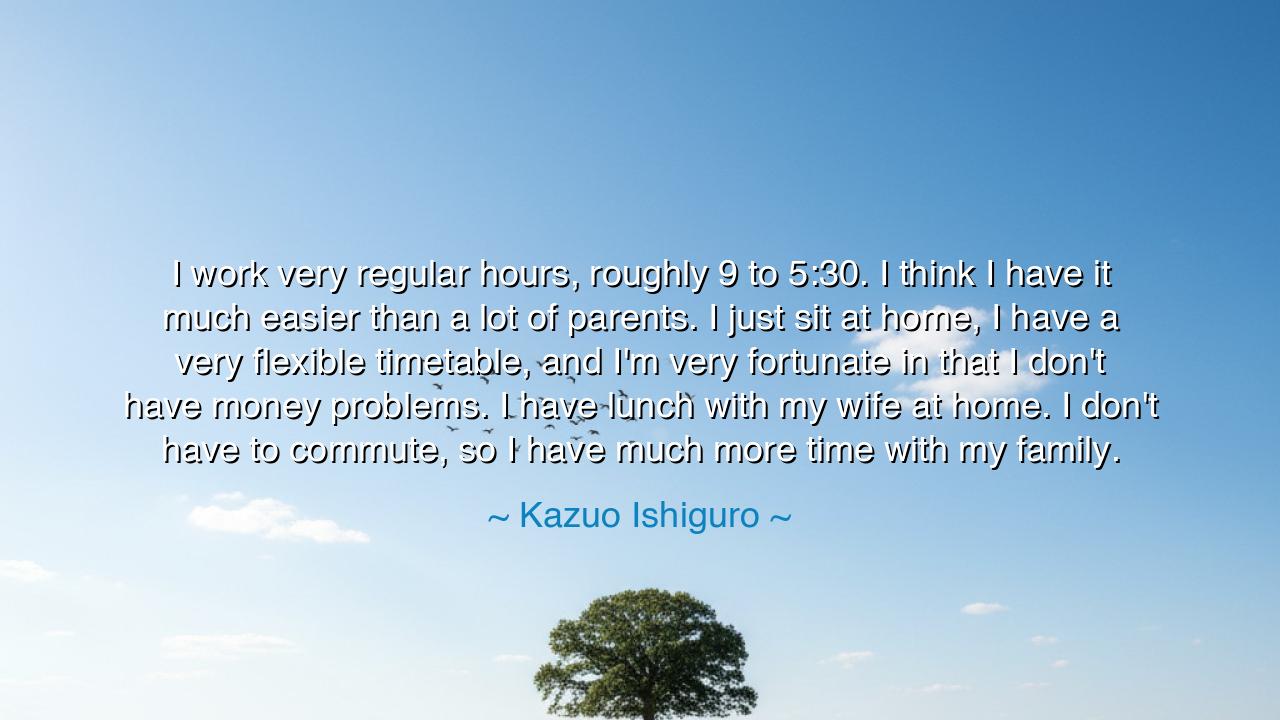
I work very regular hours, roughly 9 to 5:30. I think I have it
I work very regular hours, roughly 9 to 5:30. I think I have it much easier than a lot of parents. I just sit at home, I have a very flexible timetable, and I'm very fortunate in that I don't have money problems. I have lunch with my wife at home. I don't have to commute, so I have much more time with my family.






In the words of Kazuo Ishiguro, we hear not the boast of a man, but the soft wisdom of one who has found balance in the tempest of life. “I work very regular hours, roughly 9 to 5:30. I think I have it much easier than a lot of parents. I just sit at home, I have a very flexible timetable, and I'm very fortunate in that I don't have money problems. I have lunch with my wife at home. I don't have to commute, so I have much more time with my family.” Behind these simple words lies a truth older than empires — that the measure of a life well-lived is not in gold or glory, but in the quiet harmony between work, gratitude, and love.
In the age of the ancients, when kings built monuments to their own grandeur, the philosophers of the East and West alike spoke of the Middle Way, the path between striving and stillness. Ishiguro’s voice, humble and grounded, echoes that same wisdom. For he does not glorify the struggle, nor does he worship leisure. Instead, he honors the sacred rhythm of a balanced life, where labor serves peace, and success does not come at the price of the soul. His words remind us that simplicity is not weakness — it is mastery over chaos.
There once lived a Roman named Cincinnatus, a farmer who was called to save the Republic in its hour of peril. He left his plow, took command of the army, restored peace — and when victory was won, he returned to his field without demand for reward. Like Ishiguro, he understood that true greatness lies in knowing when enough is enough. He worked when duty called, and rested when it was fulfilled. His hands tilled the soil, but his heart was free. So too does Ishiguro cultivate his craft — steady, devoted, yet unconsumed by ambition.
The origin of Ishiguro’s words is not born in the marketplace of pride, but in the hearth of the home. Having known the turbulence of the creative mind and the solitude of the artist’s path, he recognizes fortune not as possession, but as peace. His acknowledgment of privilege and gratitude is a rare jewel in an age that clamors for more. By naming his blessings — time, family, freedom from want — he honors them. In doing so, he teaches that awareness itself is a form of worship. To forget one’s blessings is to live as a beggar in the midst of abundance.
And yet, these words also carry a gentle warning. For in the modern world, men toil endlessly beneath the illusion that busyness equals worth. They chase hours that slip through their fingers like sand, all for dreams that fade before dawn. Ishiguro stands apart from this fever, reminding us that the purpose of work is not to drown in it, but to carve from it the space where life can breathe. He shows that discipline and serenity can coexist — that the artist, though alone in his craft, need not be alone in his life.
Let us then take this teaching to heart. When the day begins, rise to your labor with clarity, but let the sunset find you at rest among those you love. Set boundaries as one sets stones to mark a sacred garden — around your hours, your family, your peace. For every mortal is given the same gift of time, yet few guard it wisely. Ishiguro’s regularity, his order and moderation, are not the habits of dullness, but the practices of freedom. He proves that structure is not the enemy of creativity, but its faithful servant.
Consider the tale of the Chinese poet Tao Yuanming, who abandoned his official post to tend his garden and write verses by the light of the sun. When asked why he left the emperor’s service, he replied, “I will not bow for five measures of rice.” In his retreat, he found eternity in small things — the scent of chrysanthemums, the laughter of his children. Ishiguro’s life mirrors this same spirit: that contentment is not a gift of fate, but the fruit of choice — the choosing of stillness over spectacle, of presence over prestige.
Thus, the lesson of this quote resounds through the ages: seek not a life of endless striving, but one of harmony. Labor well, but do not let labor devour you. Honor your fortune, but never let it blind you. And above all, cherish the sacred nearness of those who walk beside you, for they are the measure of your true wealth. Let every man and woman, hearing Ishiguro’s words, resolve to live not faster, but deeper — to weave work and love into one enduring thread. For in that quiet tapestry, the heart will find its rest.






AAdministratorAdministrator
Welcome, honored guests. Please leave a comment, we will respond soon